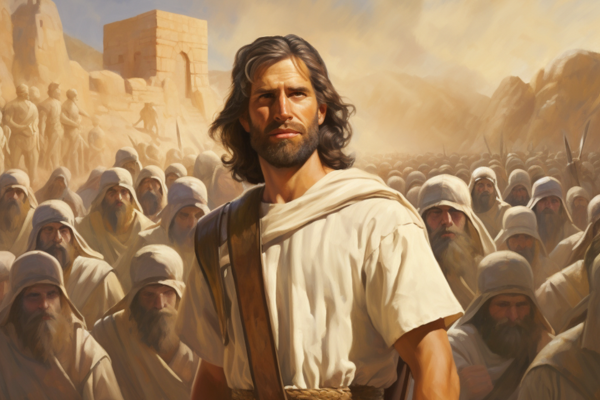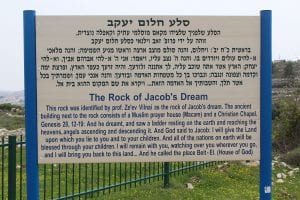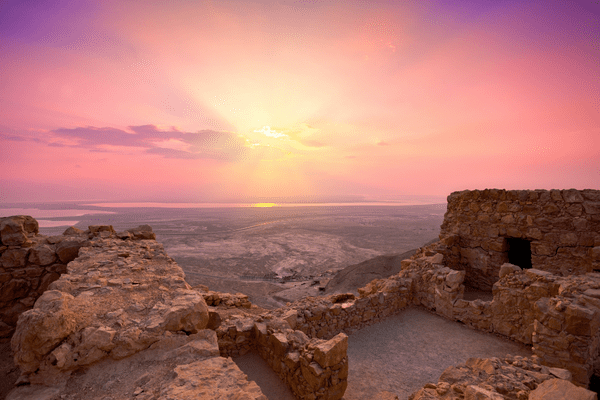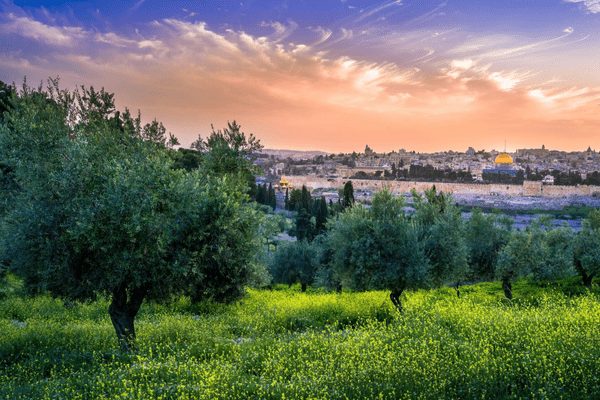
TORAH
NEVI'IM
KETUVIM
Chapter 16
Translation and Transliteration of
Listen to this chapter in Hebrew:
- Commentary
- Buy E-book
- Buy the Israel Bible
1The portion that fell by lot to the Josephites ran from the Yarden at Yericho—from the waters of Yericho east of the wilderness. From Yericho it ascended through the hill country to Beit El.
אוַיֵּצֵא הַגּוֹרָל לִבְנֵי יוֹסֵף מִיַּרְדֵּן יְרִיחוֹ לְמֵי יְרִיחוֹ מִזְרָחָה הַמִּדְבָּר עֹלֶה מִירִיחוֹ בָּהָר בֵּית־אֵל׃
2From Beit El it ran to Luz and passed on to the territory of the Archites at Ataroth,
v'-ya-TZA mi-bayt EL LU-zah v'-a-VAR el g'-VUL ha-ar-KEE a-ta-ROT
בוְיָצָא מִבֵּית־אֵל לוּזָה וְעָבַר אֶל־גְּבוּל הָאַרְכִּי עֲטָרוֹת׃
![]() 16:2 From Beit El it ran
16:2 From Beit El it ran

Sign indentifying Yaakov’s rock at Beit El
Beit El, located in the territory of the tribe of Binyamin, near the border with Efraim, has an important place in Jewish history. It is near the site where Avraham built an altar and called out in Hashem’s name (Genesis 12:8). It is where Yaakov prayed, and dreamt about the angels ascending and descending a ladder that reached to the heavens (Genesis 28:12). It was also there that Yaakov received the promise that his children would inherit the Land of Israel (28:14). In 1838, the famous biblical archaeologist Edward Robinson identified the ancient site of Beit El. Following the Six Day War, a modern Jewish community was founded adjacent to the ancient site, and given the same name. Contemporary Beit El is the home of hundreds of Jewish families who are raising their children in the city of their forefathers.
3descended westward to the territory of the Japhletites as far as the border of Lower Beth-horon and Gezer, and ran on to the Sea.
גוְיָרַד־יָמָּה אֶל־גְּבוּל הַיַּפְלֵטִי עַד גְּבוּל בֵּית־חוֹרֹן תַּחְתּוֹן וְעַד־גָּזֶר וְהָיוּ תצאתו [תֹצְאֹתָיו] יָמָּה׃
4Thus the Josephites—that is, Menashe and Efraim—received their portion.
דוַיִּנְחֲלוּ בְנֵי־יוֹסֵף מְנַשֶּׁה וְאֶפְרָיִם׃
5The territory of the Ephraimites, by their clans, was as follows: The boundary of their portion ran from Atroth-addar on the east to Upper Beth-horon,
הוַיְהִי גְּבוּל בְּנֵי־אֶפְרַיִם לְמִשְׁפְּחֹתָם וַיְהִי גְּבוּל נַחֲלָתָם מִזְרָחָה עַטְרוֹת אַדָּר עַד־בֵּית חוֹרֹן עֶלְיוֹן׃
6and the boundary ran on to the Sea. And on the north, the boundary proceeded from Michmethath to the east of Taanath-shiloh and passed beyond it up to the east of Janoah;
ווְיָצָא הַגְּבוּל הַיָּמָּה הַמִּכְמְתָת מִצָּפוֹן וְנָסַב הַגְּבוּל מִזְרָחָה תַּאֲנַת שִׁלֹה וְעָבַר אוֹתוֹ מִמִּזְרַח יָנוֹחָה׃
7from Janoah it descended to Ataroth and Naarath, touched on Yericho, and ran on to the Yarden.
זוְיָרַד מִיָּנוֹחָה עֲטָרוֹת וְנַעֲרָתָה וּפָגַע בִּירִיחוֹ וְיָצָא הַיַּרְדֵּן׃
8Westward, the boundary proceeded from Tapuach to the Wadi Kanah and ran on to the Sea. This was the portion of the tribe of the Ephraimites, by their clans,
חמִתַּפּוּחַ יֵלֵךְ הַגְּבוּל יָמָּה נַחַל קָנָה וְהָיוּ תֹצְאֹתָיו הַיָּמָּה זֹאת נַחֲלַת מַטֵּה בְנֵי־אֶפְרַיִם לְמִשְׁפְּחֹתָם׃
9together with the towns marked off for the Ephraimites within the territory of the Manassites—all those towns with their villages.
טוְהֶעָרִים הַמִּבְדָּלוֹת לִבְנֵי אֶפְרַיִם בְּתוֹךְ נַחֲלַת בְּנֵי־מְנַשֶּׁה כָּל־הֶעָרִים וְחַצְרֵיהֶן׃
10However, they failed to dispossess the Canaanites who dwelt in Gezer; so the Canaanites remained in the midst of Efraim, as is still the case. But they had to perform forced labor.
יוְלֹא הוֹרִישׁוּ אֶת־הַכְּנַעֲנִי הַיּוֹשֵׁב בְּגָזֶר וַיֵּשֶׁב הַכְּנַעֲנִי בְּקֶרֶב אֶפְרַיִם עַד־הַיּוֹם הַזֶּה וַיְהִי לְמַס־עֹבֵד׃







